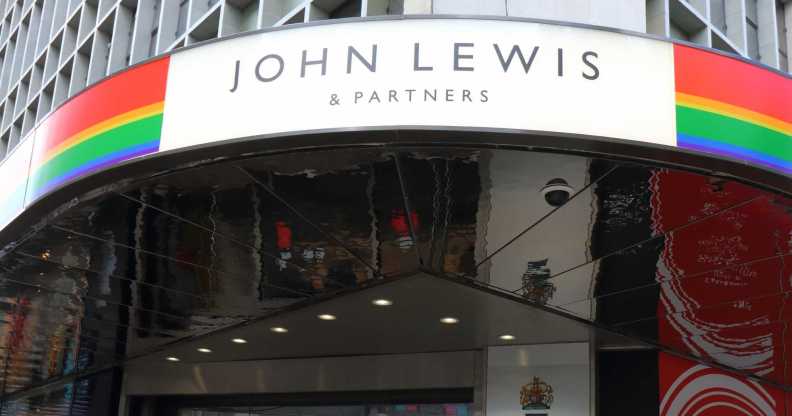Trans-inclusive feature in John Lewis staff magazine sparks fury

A John Lewis store decorated with rainbow colours in celebration of LGBTQ+ Pride. (Keith Mayhew/SOPA Images/LightRocket via Getty Images)
A trans-inclusive story in a John Lewis staff magazine has left some people furious.
The department store company, which also owns Waitrose, issued the publication – Identity magazine – to its more than 70,000 members of staff, and, to coincide with the start of LGBTQ+ History Month. The first issue included a feature with figures from LGBTQ+ charity Stonewall on the number of trans children attempting suicide, and recommended support from the charity for transgender youngsters, Mermaids.
The article, under the headline “Raising trans and non-binary children”, gave advice on chest binders. The experience of an anonymous staff member also featured, alongside charity advice, in a bid to help any parents whose children might be facing mental-health difficulties.
Binding is a practice of using a garment or cloth to compress or minimise chest tissue to achieve a flatter or more traditionally masculine chest appearance.
According to the Telegraph, the magazine, which is produced by a staff LGBTQIA+ network, advised parents that their support “can determine their child’s mental wellbeing”.
The magazine’s claim is backed up by numerous studies. In 2023, a report in the New England Journal of Medicine showed how gender-affirming care improves the mental health of trans teens.
A separate study found that access to gender-affirming healthcare significantly reduces rates of depression, gender dysphoria and suicidality among transgender people.
In 2022, the Metropolitan Police confirmed that supplying or wearing a chest binder is not a criminal offence after The Telegraph published a controversial article on the subject.
In a bid to increase inclusivity within the partnership, the magazine also printed a calendar highlighting important LGBTQ+ dates such as International Trans Day of Visibility and Asexuality Day.
But, according to the Daily Mail, the magazine has been criticised by women’s rights groups.
Helen Joyce, from Sex Matters, is quoted as saying: “We’ve known for some time that many big retailers have embraced trans ideology, but this newsletter really demonstrates how far brands are willing to go to placate the vocal minority of activists on their staff.
“Packed with hyperbole, scaremongering and ideologically driven content, it’s a complete departure from the culture and values people associate with the John Lewis brand,” she went on to say.
And Claire Loneragan, from Women’s Rights Network, told the paper: “‘This is incredibly dismissive of [John Lewis’] core shoppers – women.”
Stephanie Davies-Arai, of Transgender Trend, also criticised John Lewis, claiming the company has acted irresponsibly.
However, a spokesman for John Lewis told the Telegraph: “We want the partnership to be a place where people can work or shop with confidence, irrespective of their backgrounds.
“Multiple studies – including those from the government – show that trans people are at higher risk of hate crimes and discrimination, and this magazine was created by our LGBTQIA+ network to champion understanding and support. It has been positively received by the huge majority of our partners.
“We have a number of networks across our business, which encourage open conversations. Partners can share their own questions and experiences – even on topics where people have different views.”
Robbie de Santos, director of campaigns and human rights at Stonewall told PinkNews initiatives such as Identity magazine could help create a welcoming environment for everyone.
“Companies who want to be true leaders in their industry, attract the best talent and unlock the potential of all their staff know, that they have to foster an inclusive and welcoming environment, where anyone can thrive.
“Setting up employee support networks, actively listening, but also actively educating all of the staff members about the needs and experiences of LGBTQ+ people doesn’t put anyone else at risk or harm, but only helps them to navigate difficult conversations and nurture mutual respect.”

